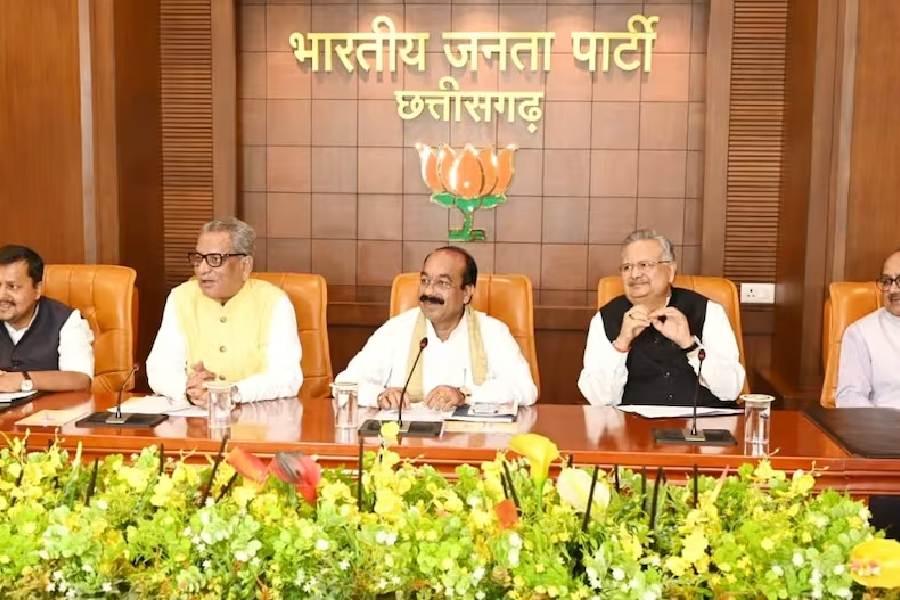The BJP, which was in power in Chhattisgarh for 15 years under the leadership of Raman Singh, suffered a massive defeat at the hands of Congress in the 2018 assembly polls.
Apart from strong anti-incumbency, charges of corruption, lack of coordination between party organisation and the government led by it, and OBCs voting in favour of the Congress were attributed as some of the prominent reasons for its defeat five years ago.
In the 2018 elections, the Bharatiya Janata Party (BJP) fielded 14 candidates hailing from Sahu community, a numerically dominant Other Backward Classes (OBC) community, but 13 of them bit the dust.
The BJP last year appointed party MP Arun Sao, who hails from Sahu community, as its state unit chief, and this move may work in its favour this time.
There are 90 seats in the Chhattisgarh assembly. The BJP has declared candidates on 21 seats for the upcoming assembly polls and most of them are representatives of panchayat bodies, which shows the party is gearing up for the electoral fight with its second-rung leaders replacing the old faces.
The party has announced to fight the elections under collective leadership without projecting any one person as its chief ministerial face, thereby sidelining the three-time CM Raman Singh.
Here is a SWOT (Strengths, Weaknesses, Opportunities and Threats) analysis of the BJP in Chhattisgarh.
STRENGTHS:
• The popularity of Prime Minister Narendra Modi is likely to work in the party’s favour in the state. After suffering a severe drubbing from the Congress in 2018, the BJP made an impressive comeback by capturing nine out of 11 Lok Sabha seats in 2019 in the state riding high on the strong image of Modi.
• The Rashtriya Swayamsevak Sangh (RSS), which had distanced itself from the BJP’s state unit in 2018, is visibly active on the ground this time.
•The BJP is trying to tread on its traditional Hindutva line by highlighting the incidents of communal violence that occurred in Bemetara and Kabirdham districts during the present Congress regime and alleged religious conversions in tribal-dominated areas.
WEAKNESSES:
•Absence of a strong second-rung leadership in the saffron party in the state.
•BJP's long-used political issues pertaining to cows and Lord Ram have been snatched by the Congress.
In July 2020, CM Baghel launched the Godhan Nyay Yojana (GNY) to procure cow dung at Rs 2 per kg, constructed Gauthans (places in villages where cows are kept in day-time) in villages, which are being converted into Rural Industrial Parks.
To keep the memories of contexts related to Lord Ram and Mata Kaushalya alive, the state government has undertaken the 'Ram Van Gaman Tourism Circuit’ project and started developing nine places on the route (in Chhattisgarh) taken by Lord Ram during his 14-year exile, as tourist destinations. The government has so far erected tall statues of Lord Ram in four of these places.
• People from assembly constituencies in the state’s rural parts are disenchanted with the BJP after it failed to keep up some of the promises it made to them during its 15-year rule.
OPPORTUNITIES:
• There is perceptible anger among people against the ruling Congress over alleged scams in Chhattisgarh Public Service Commission and liquor trade.
•Alleged differences among frontline Congress leaders appear to have disappeared at the top, but tension still persists at the bottom level. According to poll observers, rumblings within the Congress may benefit the BJP.
•The BJP feels that the Aam Aadmi Party (AAP) and Sarva Adivasi Samaj candidates will eat into the support base of Congress.
THREATS:
•The Congress currently holds 71 seats in the 90-member assembly, while the BJP’s count is 13. The Congress had bagged 68 seats in 2018 and polled 42.8 per cent votes, 10 per cent more than the BJP. According to poll observers, the BJP faces a tough challenge to bridge this huge margin and cross the majority mark of 46 seats.
•The Congress has strongly promoted regionalism in Chhattisgarh in the last five years to counter the nationalism strategy of the BJP, which happened for the first time in the state. Congress claims native population of Chhattisgarh was pushed to the edge in all spheres and no OBC, Scheduled Tribe (ST) and Scheduled Caste (SC) leaders were given prominence in the government during the 15-year rule of Raman Singh.
•According to experts, the Congress government’s pro-farmer schemes may prove to be a big challenge for the BJP. Three flagship schemes - Rajiv Gandhi Kisan Nyay Yojana, Godhan Nyaya Yojana (cow dung procurement schemes) and Rajiv Gandhi Gramin Bhomihin Krishi Majdoor Krishi Nyay Yojana - have helped the ruling Congress to visibly consolidate its position in rural and semi-urban areas of the state in the last five years.
• The BJP-led Centre is facing heat in Chhattisgarh on issues like inflation and uneven operation of passenger trains from the last one-and-a-half years.
Except for the headline, this story has not been edited by The Telegraph Online staff and has been published from a syndicated feed.











